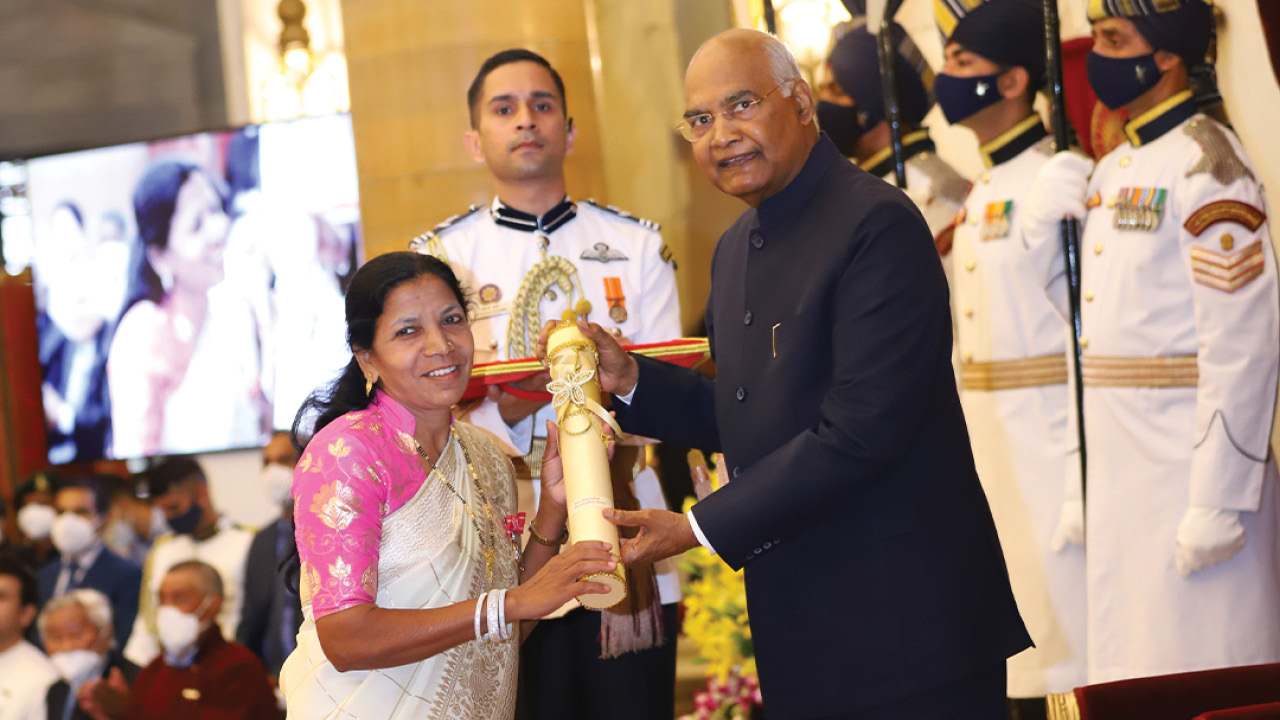Gamit Ramilaben Raysingbhai
Gamit Ramilaben Raysingbhai
Born: 1969
Gujarat
Padma Shri: 2022

About
Gamit Ramilaben Raysingbhai, a relentless tribal social worker from Taparwada Village in Gujarat’s Tapi district, was honoured with the prestigious Padma Shri Award in 2022 for her remarkable contributions to social work. Her unwavering commitment to transforming rural Gujarat into a cleaner, more empowered space earned her this recognition. The award acknowledged her exceptional work in leading initiatives for sanitation, women’s empowerment, and tribal welfare, significantly impacting lives at the grassroots level.
Education
Born on June 1, 1969, into the Gamit community—a scheduled tribe in Gujarat known for its rich cultural heritage but limited access to resources—Ramilaben’s educational journey was cut short after completing Standard X. Her formal schooling ended early in a region where education, especially for girls, often took a backseat to household responsibilities and agricultural labour. Yet, her thirst for knowledge and her passion for uplifting her community remained unquenched, guiding her life’s purpose. While she may not have pursued higher education, her lived experiences became her most excellent teacher, shaping her into a compassionate and determined changemaker.
Hardships Faced
Ramilaben’s path was laden with obstacles. Growing up in a marginalised community, she witnessed firsthand the struggles of rural life: poor sanitation, limited access to education, and deeply entrenched gender norms. The absence of proper toilets in villages meant that open defecation was a daily reality, posing serious health risks, particularly for women and children. Women had to wait until nightfall to relieve themselves, risking their safety and dignity.
Moreover, convincing villagers to abandon age-old practices was no easy feat. Facing skepticism and resistance, she had to build trust one family at a time. Financial constraints further added to the challenges, making procuring materials and organising awareness programs difficult. Additionally, navigating bureaucratic red tape to access government support required perseverance and resilience. Countless setbacks marked her journey, but she remained undeterred, forging ahead with an unyielding spirit.
Contributions that Brought About the Change
Ramilaben’s transformative journey began with a singular vision: to improve the living conditions of her fellow villagers. She started by tackling the most pressing issue—sanitation. She mobilised communities to build over 700 sanitary units through persistent efforts, ensuring nine villages became open-defecation-free. Her strategy was twofold: building infrastructure and cultivating awareness. She organised numerous educational campaigns to shed light on the health risks of open defecation, using simple yet impactful messaging that resonated with the villagers. She held community meetings, engaged with local leaders, and went door-to-door to personally connect with families, addressing their concerns and encouraging them to adopt safer sanitation practices.
Her work didn’t stop at sanitation. Recognising the power of economic independence in women’s empowerment, she established 162 self-help groups (SHGs), bringing together women from various backgrounds to collectively save money, access microloans, and launch small businesses. These SHGs became conduits for delivering government schemes directly to the tribal population, ensuring benefits like the Pradhan Mantri Suraksha Bima Yojana, Pradhan Mantri Jeevan Jyoti Yojana, Atal Pension Yojana, and Sukanya Yojana reached those in need. The SHGs also became platforms for skills training, equipping women with the knowledge to run microenterprises, from tailoring and handicrafts to small-scale farming initiatives. Ramilaben also championed widow welfare, ensuring women received support and financial aid. By empowering women economically, she was improving household incomes and fostering a sense of self-worth and autonomy among women.
During the COVID-19 pandemic, her work became even more crucial. She took the lead in distributing masks and sanitisers, spreading awareness about the virus, and ensuring that her community had access to government relief measures. Her efforts played a pivotal role in mitigating the spread of the virus and providing much-needed support to families facing financial hardships during the lockdown.
Before and After
Before Ramilaben’s interventions, the villages were marred by unsanitary conditions, with open defecation being the norm. Women had little economic independence, and awareness about government schemes was minimal. Health issues stemming from poor sanitation were rampant, and the lack of proper infrastructure kept the community in a cycle of poverty and disease. Women had limited livelihood opportunities, and most were confined to household chores and agricultural labour.
After her tireless efforts, the transformation was palpable. Nine villages achieved open-defecation-free status, leading to a dramatic drop in sanitation-related diseases. The construction of toilets improved hygiene and restored dignity and privacy to women, who no longer had to venture into the fields under darkness. Once confined to domestic roles, women became entrepreneurs and financial decision-makers through the SHGs. Awareness about government schemes improved, and families began to access benefits they had never known existed.
The villages witnessed a newfound sense of dignity and hope. Children, especially girls, could now focus on their education without the added burden of household chores or the fear of unsafe sanitation practices. Her work’s ripple effects extended beyond health and hygiene, touching every aspect of life in these villages.
Achievements and Accolades
In recognition of her tireless work, Ramilaben received several accolades. Apart from the Padma Shri in 2022, she was awarded the “Swachh Shakti Award” in 2017 for her outstanding performance under the Swachh Bharat Abhiyan. She was also honoured with the “Nari Tu Narayani Award,” celebrating her efforts in women’s empowerment. Her name became synonymous with resilience and change, and her story inspired many women in her community to step forward and take charge of their lives.
Ramilaben’s journey from a young girl in a marginalised tribal community to a Padma Shri awardee is a testament to the power of persistence and grassroots leadership.
Her story inspires countless others, proving that change begins with a single step and an unyielding spirit. Today, the villages she transformed exemplify what determined individuals can achieve with courage, compassion, and a vision for a better future.

